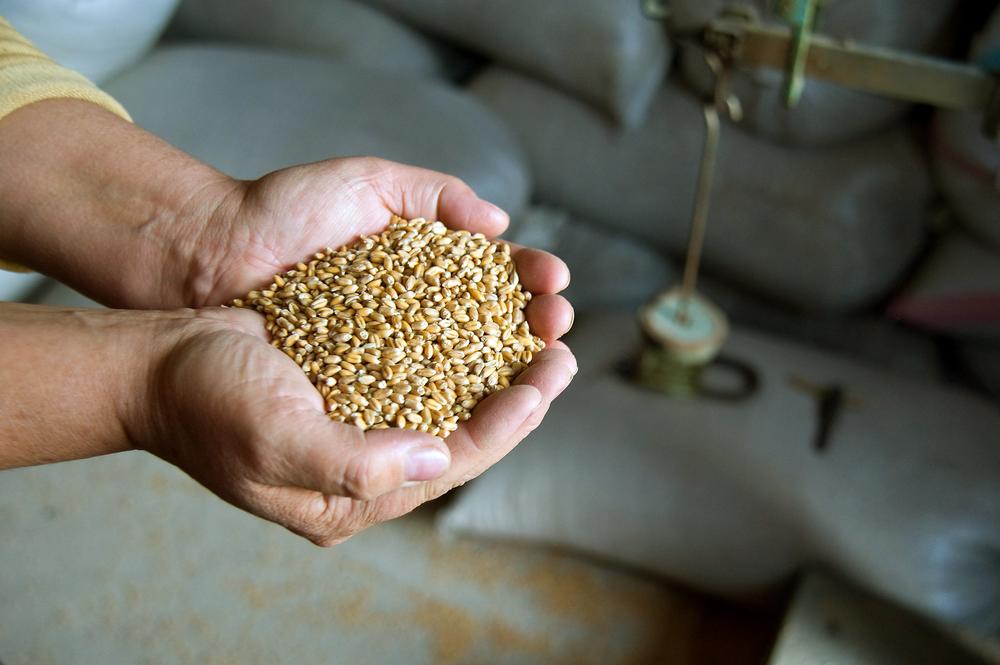First 100 Days of Government: Agrarian politics and the impact of the war in Ukraine
Food security instead of climate protection? An interview with Lea Zentgraf and Federico Masson, doctoral researchers in the Food for Justice junior research group at Freie Universität
Mar 28, 2022
Due to its fertile black soil, Ukraine is one of the most important exporters of wheat in the world. The war could now deepen hunger and food insecurity for millions of people around the globe.
Image Credit: UN Women/David Snyder
Nutrition has long been a political issue: What do people eat? How was the food grown or produced? At what price? What about supply chains and transportation routes? Agriculture and food production are global and worth billions. In general, it is not a lack of food that causes the long-term hunger crisis in some world regions, rather the fact that it is unequally distributed. Further, environmental damage is a price we all pay for the modernization of the food system.
The Food for Justice junior research group at Freie Universität Berlin addresses the issue of how social, ecological, and just food systems can be designed. To find answers, doctoral researchers Lea Zentgraf and Federico Masson are studying social movements committed to a socio-ecological transformation in agriculture and food production.
In the interview sociologist Lea Zentgraf and social anthropologist Federico Masson explain how the new three-party coalition government in Germany reacted to the demands of food movements and initiatives in its first 100 days and the consequences the war in Ukraine is having for German agricultural policy.
Ms. Zentgraf, Mr. Masson, Russia and Ukraine are major grain exporters. Failure of their deliveries due to the war would threaten supplies in some of the poorest regions of the world. Do nature and climate protection and the plans of the new German government now have to be put aside in order to prevent famine?
Federico Masson: Grain prices are already rising worldwide as a result of the Russian war against Ukraine, and significant losses are expected for wheat and corn in particular. Some countries in the Global South are already struggling with supply bottlenecks. In addition, there is what social scientists refer to as a multiple crisis: the climate, biodiversity, and soil crisis. These interrelated, mutually influencing crises deepen global food insecurity, as does the geopolitical crisis in Ukraine.
However, the war must not be “played off” against climate protection. The current IPCC report on climate change shows how fatal it would be to turn away from the Green Deal. It would be a mistake to put ecological priorities aside in favor of unbridled production.
Lea Zentgraf: The war in Ukraine is making the vulnerabilities of the German and European agricultural systems very apparent. Dependence on synthetic fertilizer made from Russian gas undermines Europa’s food security. Animal husbandry in Germany is also heavily dependent on imports of grain and oilseeds to feed the livestock.
Social movements have long been calling for a transformation toward sustainability and food justice. They specifically propose using more agroecology, reducing the high dependency on imports and exports, and strengthening regional supply structures. This would ensure a sustainable and crisis-resistant food supply.
At the end of March, a conference of German federal and state agriculture ministers will take place in Magdeburg. What decisions can be expected from the meeting, in particular regarding the impacts of the war in Ukraine?
Federico Masson: Undoubtedly, the consequences of the war for German agriculture and food security will play a major role. However, it is difficult to assess which concrete decisions will be made. It is clear that there should be support for the agricultural sector and farmers, which usually means less environmental and climate protection. For example, as an exception this year, farmers will be allowed to grow crops for animal feed on land usually reserved as Ecological Focus Areas.
Current challenges for agriculture in Germany are, above all, the high energy costs and obstacles on the livestock market. Both are contributing to rising food prices. The feared loss of oilseeds and protein crops from Ukraine is a particular cause for concern. However, as Agriculture Minister Cem Özdemir emphasized, there is no threat of supply shortages in Germany. Until now, the affected agricultural sectors are primarily the German meat industry intended for export.
Demonstrators are demanding a reversal in agricultural and food policy from the government.
Image Credit: Lea Zentgraf
In January, for the twelfth time in a row, farmers drove their tractors to Berlin to take part in the “We are fed up” demonstration in Berlin organized by the “My Agriculture” coalition for socially-, environmentally-, and climate-just agriculture and nutrition. As part of the Food for Justice junior research group you interviewed people who took part in the demonstration. What did you find out?
Lea Zentgraf: In Germany, the “My Agriculture” [Meine Landwirtschaft] coalition is the largest coalition of social movements related to the topic of food. It is, therefore, particularly relevant for our research group. We were also involved as participating observers in many of the coalition’s actions and initiatives. In 2020 we conducted a first representative protest survey.
The findings show that many interviewed participants hope to create transformation through their own way of life. Eighty percent of those who responded stated that they specifically buy food products for political or ecological reasons. More than half have changed their diet to improve the climate. In addition, the demonstrators are calling for a turnaround in agriculture and nutrition on a political level and not just on a consumption-oriented dimension. Far-reaching social change cannot be achieved by individual purchasing decisions alone because that would simply ignore economic inequalities.
In previous years the “We are fed up” protests mobilized large street demonstrations. During the past two years, these were not possible due to the coronavirus measures, but the coalition still appeared in Berlin with tractors and alternative protest actions. This year there was a unique digital protest called “Leek Relay” (#Staffel-Lauch). The idea was to record short video messages with demands for an agricultural and food turnaround. The creative element was a leek that was symbolically passed on like a baton. The result: more than 1500 video messages were submitted. In addition, on January 22, the German Federal Minister of Agriculture Cem Özdemir was presented with the symbolic leek with a printed QR code.
The Wir haben es satt! [“We are fed up!”] demonstrations have been taking place since 2011. Cem Özdemir (with leek and microphone) is the first German Federal Minister of Agriculture to speak with the protesters.
Image Credit: Lea Zentgraf
The new German government has set itself goals to support more organic farming and animal welfare and move away from factory farming and depleted soil. The three-party coalition has now been in office for 100 days – what is your assessment of its agrarian and food politics?
Lea Zentgraf: The new coalition agreement has a lot of potential for actual agricultural and food reform. For many activists and farmers, however, it was disappointing that the recommendations of the Commission on the Future of Agriculture (Zukunftskommission Landwirtschaft) and the Borchert Commission did not appear in the coalition agreement.
The goal of up to 30 percent organic farming by 2030 is ambitious, but no concrete concepts for implementation have been presented so far. In the area of animal welfare, the coalition intends to introduce mandatory husbandry labeling later this year. It remains unclear exactly how the conversion of animal husbandry is to take place. Agriculture Minister Cem Özdemir often refers to the ideas and concepts of the commissions, but one thing is certain: in the first 100 days, the coalition has not presented a single bill or initiative related to agricultural and food policy.
Sören Maahs conducted the interview. It was originally published in German on March 23, 2022, in campus.leben, the online magazine of Freie Universität Berlin.





![The Wir haben es satt! [“We are fed up!”] demonstrations have been taking place since 2011. Cem Özdemir (with leek and microphone) is the first German Federal Minister of Agriculture to speak with the protesters.](/en/featured-stories/research/2022/food-for-justice-100-days-coalition/cem-oezdemir-enough-protests.jpg?width=1000)